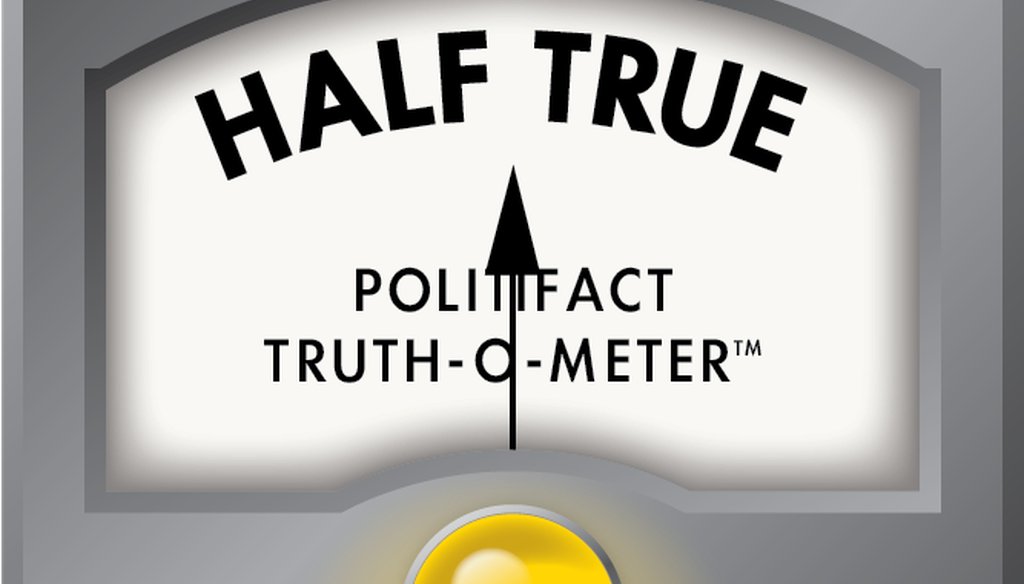Get PolitiFact in your inbox.

Arianna Huffington received a Half True for her claim about Halliburton.
Liberal media mogul Arianna Huffington took PolitiFact to task the other day because we found her claim about Halliburton defrauding the government to be Half True. In her July 5 column, she complained about the "absurdity" and "ludicrousness" of our rating. Her big charge: We were too even-handed.
Huffington, who has often promoted PolitiFact’s work when we skewered Republicans, said our "attempt to bend over backwards to find the comfort of the middle ground is part of the problem (PolitiFact) was presumably formed to combat."
Her column led to a flood of angry e-mails from Huffington Post readers who wrote us to say the ruling was "shameful" and we were trying "to defend Halliburton’s reputation."
The rhetoric in many cases was over the top, but I share some of the frustration about our Half True ratings. It’s more fun to award a False or light up the Truth-O-Meter with a Pants on Fire, which we reserve for the most ridiculous falsehoods. Half Trues are often unsatisfying, the PolitiFact equivalent of a tie game.
But it’s silly to suggest we were seeking a safe "middle ground." In fact, two days after her column ran, Huffington Post published a piece by another writer complaining that we gave Democrats too many False ratings.
Since the St. Petersburg Times launched PolitiFact three years ago, we’ve made 1,500 Truth-O-Meter rulings, an extraordinary commitment to fact-check journalism by a U.S. newspaper. We did more than 750 during the 2008 presidential campaign, then pivoted to examine Congress, the White House and pundits. This year, we expanded with state editions in Florida, Texas, Georgia, Rhode Island and soon, Ohio.
Our Truth-O-Meter is based on the concept that the truth in politics is often not black and white, but shades of gray. We have three levels of gray between True and False — Mostly True, Half True and Barely True.
Our definition of Half True: "The statement is accurate but leaves out important details or takes things out of context."
About 20 percent of our ratings have been Half True. We actually award more True ratings than anything else — 22 percent — unless you count the combined number for False and Pants on Fire, which together account for about 29 percent.
Lately, we’ve awarded a flurry of Half Trues, particularly for the TV ads we check in our Message Machine feature with NPR.
For example, an ad from the liberal group Americans United for Change earned a Half True for a claim that Sen. Richard Burr, R-N.C., "let Big Oil off the hook." The ad, which featured powerful images of the oil spill, was right that Burr had voted in favor of the oil industry on a bill, but it was missing important context that the bill had nothing to do with the oil spill.
A Half True isn’t sexy, but it’s often the right call. It is not only Half True, but also Half False. The truth has been stretched but not broken.
Cheney vs. Huffington
The Huffington Post has highlighted our False ratings for Sarah Palin, Dick Cheney, Glenn Beck and Senate Republican leader Mitch McConnell, just to name a few.
When we began fact-checking the newsmaker segments on ABC’s This Week, Arianna Huffington encouraged us to also check the roundtable segment where she often appears. And several times, her writers praised our work for This Week and took jabs at NBC’s Meet the Press for not doing similar fact-checking.
But then Huffington herself got to face our Truth-O-Meter. In the roundtable on the June 6 show, she mixed it up with conservative commentator Liz Cheney about Halliburton’s bills during the Iraq war. Huffington noted that Halliburton was involved with the Deepwater Horizon rig that collapsed in the Gulf of Mexico and she said that during the war, the company had "defrauded the American taxpayer (of) hundreds of millions of dollars."
Cheney replied, "Arianna, I don’t know what planet you live on ..."
Huffington’s response: "I’m so glad PolitiFact is going to be checking this."
And so we did.
We typically take about a day to research and write a Truth-O-Meter item, but we devoted nearly three days to this one. Veteran PolitiFact writer Angie Drobnic Holan, a member of our team that won the Pulitzer Prize for national reporting in 2009, read government reports, audits and news stories about Halliburton’s bills to the government. Holan also interviewed officials from the Commission on Wartime Contracting in Iraq and Afghanistan, which studied the Halliburton bills, and the Center for Strategic and Budgetary Assessments, a think tank that analyzes defense spending.
In our ruling on Huffington’s claim, we said we "find much in the public record to support her statement, most notably the Justice Department lawsuit. Certainly there have been hundreds of millions of dollars that Halliburton’s KBR attempted to charge the government that have been denied." We also noted a civil lawsuit that charged KBR defrauded the government by hiring private security in violation of their contract; that lawsuit has not yet gone to trial. We noted that Halliburton sold the KBR subsidary in 2007 and no longer is involved in wartime contracting.
So, hundreds of millions of dollars have been identified as wasteful and potentially fraudulent, but the lines are not clear.
And when the military had a chance this year to stop using KBR’s services, it declined. Military officials said the company was a critical supplier to the military in Iraq and Afghanistan, and there was no other company that could step in and take its place without major disruptions. So we rated Huffington’s statement Half True. She had some good points, but her statement left out important details.
That didn’t sit well with Huffington. Her column, headlined "PolitiFact Embraces Equivocation; the Truth Gets Squeezed," was a guns-blazing attack. She said our article "turned into a model of how to avoid the truth. This is a favorite trick of those in positions of power: using ambiguity and complexity as a sort of chemical dispersant on the truth. Dilute it enough and it becomes unrecognizable."
Never mind the many times she promoted our work.
We make the call, take the heat
We recognize that people often disagree with our rulings — particularly the people being checked. On Thursday, NPR aired a segment about our state sites that began with Texas Lt. Gov. David Dewhurst, a Republican, grumbling about a False rating he’d gotten on PolitiFact Texas, which is run by the Austin American-Statesman. "This is regrettably a new low for the Austin American-Statesman and for this particular group," Dewhurst told NPR. "It shouldn’t be in the newspaper. It should be on the editorial page. I mean, for heaven’s sakes."
We take criticism seriously and correct our work if we’ve made an error.
You may not always agree with our calls, but we aren’t timid about making them. PolitiFact remains one of the few places in American journalism where elected officials — and pundits such as Huffington — are held accountable for what they say.
Her complaints came just a few weeks after we got a full-court press from the conservative Heritage Foundation, a think tank that complained we had improperly sided with President Barack Obama on a claim about health care. The think tank did not want to be associated with the Democratic president.
The lesson of these episodes and many others is that we have found one thing that conservatives and liberals agree on: they don’t like it when independent news organizations hold them accountable for what they say.
Our Sources
Arianna Huffington on Huffington Post, PolitiFact Embraces Equivocation, the Truth Gets Squeezed, July 5, 2010




















































